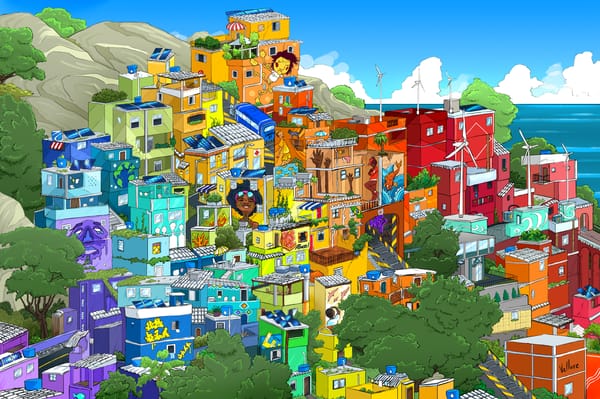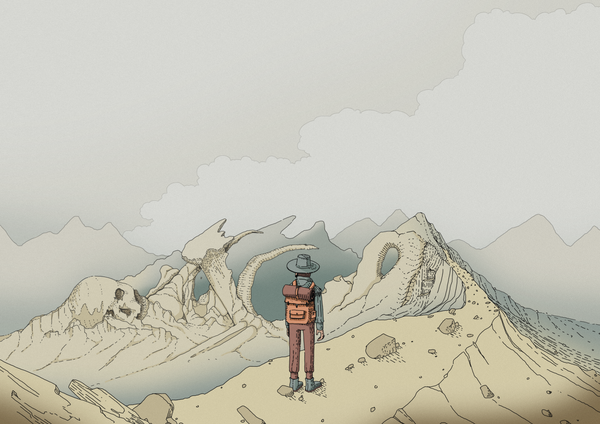Digital Strategy for Organisations
Digital power is created through the interplay of mobilizing and organizing. Open Social protocols bridge the gap.

Any organisation engaged in movement-building needs a persistent, online space where its volunteering collaborators can congregate, bond and maintain momentum through a higher degree of connectivity than a weekly newsletter. The passionate ones need a place where they can show up and get into it on a regular basis.
Unfortunately the mainsteam platforms for online space-making are feudal fiefdoms who've amassed so much power that they are increasingly at the root of the very problems the average non-profit organization exists to remedy.
The same domineering forces that are degrading our democracies and poisoning our planet have been doing the exact same thing to our virtual biosphere. As Cory Doctorow says of The curious, intertwined history of climate and digital rights activism:
There's an inchoate movement groping its way to understanding that it is a movement – that the problems of labor exploitation, fascism, climate degradation, surveillance, authoritarianism and genocide are all connected to each other by the fact that they are caused by extreme concentrations of wealth and power.
To save our world wide web-of-life, including its digital ecology, we need a rewilding of the internet.

Make Space To Grow
We need to stop thinking of internet infrastructure as too hard to fix. It’s the underlying system we use for nearly everything we do. The former prime minister of Sweden, Carl Bildt, and former Canadian deputy foreign minister, Gordon Smith, wrote in 2016 that the internet was becoming “the infrastructure of all infrastructure.” It’s how we organize, connect and build knowledge, even — perhaps — planetary intelligence. Right now, it’s concentrated, fragile and utterly toxic.
Ecologists have reoriented their field as a “crisis discipline,” a field of study that’s not just about learning things but about saving them. We technologists need to do the same. Rewilding the internet connects and grows what people are doing across regulation, standards-setting and new ways of organizing and building infrastructure, to tell a shared story of where we want to go. It’s a shared vision with many strategies. The instruments we need to shift away from extractive technological monocultures are at hand or ready to be built.
Facebook, Instagram, TikTok and X/Twitter will happily grant you an audience in their kingdom, even if you're being critical of their platforms. That is, until you're so effective at your job that you actually pose a legitimate threat to their supremacy, in which case they will lower your reach as they see fit, or simply banish you from their dominion altogether under the pretense of "system error" or "ToS violation".
Protocols, Not Platforms
The world's polycrisis requires action on many fronts, and our technofeudalistic predicament is no exception. But in the technological realm we have one particularly impactful tool at our disposal that has made massive inroads in the last two years: Protocols.
A compelling case for protocols as a way to re-democratize the web was made in Mike Masnick's paper from 2019:

We’ve gone from a world in which protocols dominated to one in which centralized platforms controlled all. Moving us back toward a world where protocols are dominant over platforms could be of tremendous benefit to free speech and innovation online.
Such a move has the potential to return us to the early promise of the web: to create a place where like-minded people can connect on various topics around the globe and anyone can discover useful information on a variety of different subjects without it being polluted by abuse and disinformation. Simultaneously, it could enable greater competition and innovation on the internet, while also giving end users more control over their own data and preventing giant corporations from having too much data on any particular user.
Moving to protocols, not platforms, is an approach for free speech in the twenty-first century. Rather than relying on a “marketplace of ideas” within an individual platform—which can be hijacked by those with malicious intent—protocols could lead to a marketplace of ideals, where competition occurs to provide better services that minimize the impact of those with malicious intent, without cutting off their ability to speak entirely.
It would represent a radical change, but one that should be looked at seriously.
Think of our digital protocols as shared standards that enable interoperability and coordination among people on-line.
It's what empowers you to move from one telecom provider (a platform) to another without having to change your phone number (a protocol standard).
It's the reason you can send an email (a protocol standard) from yourmail@gmail.com to friendsmail@outlook.com even though they're two different service operators (platforms).
Obviously this hasn't prevented telecoms from becoming supersized and Gmail maintains around a 30% market share, but you'll notice that both telecoms and email providers have been subject to far less platform decay than their social-media counterparts.
I posit, with most technology activists agreeing, that this is because the telecoms and email providers are being kept (minimally) honest by the protocols inherent to their platforms, which prevents customer lock-in by ensuring cross-platform interop and a right-to-exit. If you don't like the service you can actually leave.
Internet nerds have been trying to standardize protocols for social media since the 2000s, but after massive capital infusion the social web grew too quickly for any widely agreed upon standard to achieve critical mass, which has left us with an oligopoly of personal data fortresses that everyone hates but no one can fully leave because that would entail losing our social connections and data in the process.
But as is inevitable when any institution gets too big to care, these platforms have gotten so egregiously bad that enough people don't care right back; they want out, even if that means having to start from scratch.
What's important is that there's somewhere for people to go.
"In times of crisis, ideas can move from the fringe to the center in an eyeblink. Our job is to keep good ideas lying around, in anticipation of that crisis."
Bluesky and AT protocol
When Elon bought Twitter, Bluesky became the best idea lying around during one ensuing crisis after another.

Archive-link: https://archive.ph/kttLI
Graber, a former software engineer, seems most energized when she’s talking about the unique infrastructure for her kingless world. Undergirding Bluesky as well as several smaller apps is the Atmosphere, or AT Protocol, which is a rule book that servers use to communicate. The open source protocol allows sovereign digital spaces to integrate with one another as needed. Two apps with complementary ideas about moderation or ads can work in tandem—or not. It’s up to them.
Graber sees Atmosphere as nothing less than the democratized future of the social internet, and she emphasizes to me that developers are actively building new projects with it.
The network now counts 40 million members. That may seem like a small number compared to the hundreds of millions reported by its competitors, but those numbers are grossly inflated by bots and dubious counting methods, which most tech journalists repeatedly fail to note.
When looking at actual impact, many news outlets are reporting higher rates of engagement and incoming traffic on Bluesky with only 1/10th of the followers. The Guardian has left X altogether, finding it untenable. Best of all, Bluesky is the definitive platform of choice for the science community.
Even so, Bluesky was just the onboarding mechanism; the "killer app" needed to kickstart the app-agnostic infrastructure underneath. What we have now is an open network of 40 million people that any budding social media app can build on top of to supercharge its rise, thus competing on a relatively even footing with the powerful network effects of Big Tech incumbents.
The next 100M users on AT will come from other startups. Any indie platform creator can opt to interoperate with the AT protocol, and lots of us are doing exactly that:

The AT protocol's ecosystem of interoperating applications already has fully operational alternatives for most of the usual suspects. (More than one option actually, but these are the most mature examples.)
- Instagram --> Flashes
- Substack --> Leaflet
- Meetup --> OpenMeet
- GitHub --> Tangled
- TikTok --> Skylight
- Twitch --> Streamplace
If you already have a Bluesky account you can also sign into any one of these services. Or, if your first step into the open social web is via any of the above services (though only a few have opened up their own native accounts management so far), you can use that account to sign into Bluesky, as with the rest.
What's still missing is an alternative to the likes of Discord or Facebook Groups. Why is group discourse so important for organizations? Because while Bluesky and other such feed-centric apps are great for mobilizing, they're not the right tool for organizing, and change-makers need both to be effective.
Mobilizing vs Organizing
Legendary labor organizer Jane McAlevey left us with a powerful lesson about the shortcomings of an overly mobilization-reliant strategy:
The root cause of social and economic inequality is an inequality of power. The key to rebuilding a powerful progressive movement is a return to bottom-up base building. Yet too often today, organizations and movements confuse mobilizing mechanisms versus strategies that rely on a deeper form of organizing, one that places ordinary people at the center of struggles for change.
The class of social media applications centered around a firehose-feed of information - like Bluesky, Twitter, Instagram and Tiktok - are broadcasters. Such comms tech is great for mobilizing people around a timely call to action. It enables activist influencers to direct mass attention towards some momentary objective.
What the broadcast feed lacks is continuity and a lasting sense of place and purpose. The planetary discourse moves in lockstep with the 24hr news cycle. Anything older than yesterday gets pushed out of view. This makes it impossible to sustain deep, wide ranging conversations over longer timespans, which is a prerequisite for sense-making.
That's the magic of group chat; it's an actual place for people to be invited into and stick around in. A place where relations, trust and shared language gets built. Every organization with a rich subject matter would be wise to cultivate a community of practice where ongoing topics and initiatives persist for weeks, months and even years, letting knowledge and relationships alike compound.
Maybe this doesn't sound reminiscent of your work's incessant Slack/Teams chat or your rowdy Discord gaming cohorts, but that is a design flaw, not an inherent limitation of the chat paradigm.
Roomy, the gardenable group chat
I started writing this post in the wake of talking to local NGOs about what Roomy (now in early-access alpha) could do for them and their greenfield digital presence. In the process I realized I couldn't explain the value proposition of Roomy without contextualizing it in the wider AT ecosystem it inhabits.
Roomy exists to fill a gap, both in the AT repertoire but also the internet at large. Chat is minimum-viable anything; get two or more people together in a chatroom and you are now building community together.
Many people still perceive of chat as only marginally less chaotic than its feed-centric cousins, and in the case of apps like the earnestly named Discord (meaning lack of agreement or harmony, as between persons, things, or ideas), that perception holds true. But I come from a different tradition of slower, intentional discourse, treating communication as a practice of digital gardening.

Roomy is a freeform community garden for messages both big and small, fast and slow, wherein participants cultivate knowledge together at the speed of understanding.
On top of that, thanks to the networking magic of the AT protocol we can build discoverability of common cause into our shared spaces. So just like Amazon telling you about other books you may enjoy based on what you've read, we can tell you about other pro-social groups in your locality, physical or virtual.

Find the others
Our message for online change-makers is thus:
If you're a grassroots organization, don't waste your breath yelling into the void of the "town square" to get your message out there. For it is not a town any longer, it's a megacity where any singular voice immediately drowns in the noise of millions.
And don't look for "followers", for anyone who's following you is simultaneously following a thousand other spokespeople, breathlessly proselytizing from atop their soap box every day.
There's a lot you don't want to learn from startup culture, but if there's one thing it has figured out it's how to go from nothing to something. When you're small you can do things that don't scale. That means reaching out to people directly to say "we like what you're putting out and we want you alongside us in our community".
Once you've gathered a hundred people together in a space of persistence, 10-20 of which are showing up regularly and with zeal, only then are you in a position to make yourself known to the wider public, as your voice it now amplified by the supporting cheers and distributed advocacy of your trusted community leaders.
This is the interplay we envision between the organizational power of Roomy and the mobilizational capacity of Bluesky. In tandem they form a unique affordance of planet-scale communications unlike anything we've ever had before in our collective pursuit of broad-boundary coalition building.
Seize the means of communication
The internet activist Cory Doctorow has inspired a lot of the work that's gone into Roomy and its earlier iterations of years past. Cory's two latest books explain how we got ourselves into the mess we're in, and then points toward how we can get ourselves out again:
- The Internet Con: How to Seize the Means of Computation
- Enshittification: Why Everything Suddenly Got Worse and What To Do About It
It really comes down to this:
If you’ve never tried to organize a movement without the internet, I’m here to tell you, it’s really hard. We need to seize the means of computation, because while the internet isn’t the most important thing that we have to worry about right now, all the things that are more important, gender and racial justice, inequality, the climate emergency, those are struggles that we’re going to win or lose by organizing on the internet.
Chat is the minimum-viable tool for online organizing. Without complete control over our means of communication, our ability to organize depends entirely on the goodwill of the very same hegemonic incumbents which we aim to dethrone. They're fine with our rebellious streak so long as it's ineffective, but once it starts actually working their benevolent nature will fade away as if it was never there, just like their long gone ambition to not be evil.
We will not have digital power unless we make it for ourselves. There's only one way for us to reclaim the web as the liberatory technology it was meant to be: Stop Begging. Start Building.
Want to use Roomy for your organisation? You can play with our alpha at roomy.space and contact me at e.soghe@gmail.com directly to talk more.







